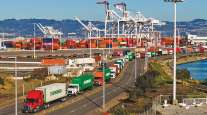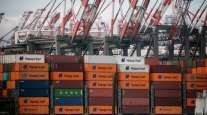Senior Reporter
Labor, Maritime Leaders Discuss Expanded Hours at West Coast Ports

[Stay on top of transportation news: Get TTNews in your inbox.]
Negotiators with the International Longshore and Warehouse Union and the Pacific Maritime Association are discussing a plan to allow all West Coast marine terminals to open an hour earlier, at 6 a.m., under what’s called “a double flex.”
This point is one of several under discussion now in San Francisco as ILWU and PMA are in the midst of negotiations for a new, multiyear contract covering some 22,000 workers at 29 locations in California, Washington and Oregon.
Harbor Trucking Association President Matt Schrap said the double-flex proposal has the support of his organization because it would open port gates to more truck drivers, adding more time to what is considered the most productive time of the day.
It’s hard to believe that a major marine terminal that handles 40% of the nation’s cargo opens at 8 a.m. Those are banker's hours.
Harbor Trucking Association President Matt Schrap
“It’s on the table to start earlier,” Schrap said. “The double flex would allow them to open at 6 a.m., instead of the flex, which is 7 a.m. and the normal opening time is 8 a.m. It’s hard to believe that a major marine terminal that handles 40% of the nation’s cargo opens at 8 a.m. Those are banker’s hours; 7 a.m. is better, and 6 a.m. is probably the best we can get at this time and it’s a step in the right direction.”
The current contract is set to expire July 1 and under that agreement, the existing work shifts are 8 a.m. to 5 p.m., 6 p.m. to 3 a.m., and the overnight “hoot” shift runs from 3 a.m. to 8 a.m. However, provisions in the pact allow terminal operators to “flex” the start times by one hour, to 7 a.m., but currently not by two hours.

How can trucking companies persuade new drivers to stay? Host Mike Freeze brings in onboarding expert Anthony Pellegrino of Ag Energy Transport. Tune in above or by going to RoadSigns.TTNews.com.
“We in the trucking industry start early,” Schrap said. “I think if all the terminals do it, and they’re consistent across all the terminals, you’ll see more activity in the morning. I would guarantee it, and it would give us more time prior to dealing with Southern California’s legendary traffic.”
At the urging of the Biden administration, the Port of Los Angeles and Long Beach had begun operating the “hoot” shift. Port officials, though, have acknowledged that decision has generated only minimal business because most warehouses in Southern California do not operate on a 24/7 basis.
“They’re trying to get more in alignment with the available time of the dray truck drivers, which today is still very much daytime-orientated because of the way the operations are at the distribution centers and warehouses,” said Paul Bingham, director for transportation consulting for S&P Global Market Intelligence, in an interview with Transport Topics. “Moving up the start time which might, for some of the dray truck drivers, result in another entire turn before they run out of time.”
Talks are scheduled to continue on a daily basis in San Francisco until an agreement is reached. The talks are not open to the media or the public. Both sides say they expect cargo to keep moving until an agreement is reached.
# # # — ILWU Coast Longshore Division (@ilwulongshore) May 9, 2022
PMA and ILWU are in a self-imposed news blackout during the contract talks, and neither side is answering questions on the issues under discussion.
The White House is closely watching what’s taking place at the bargaining table because of the impact a breakdown in negotiations could have on the national supply chain.
“There is always a level of concern that comes with uncertainty,” said Thomas O’Brien, executive director of the California State University-Long Beach Center for International Trade and Transportation. “I’m optimistic and hopeful that there is a willingness to finish these talks and settle this quickly.”

O'Brien
However, O’Brien concedes that negotiations on critical issues such as increased automation at the ports could be problematic.
“There has to be a middle ground or else we are in serious trouble,” O’Brien said. “It’s the elephant in the room that we cannot ignore. There is a potential benefit to the regional economy making sure we have a more efficient supply chain, and some of that is technology-driven.”
But O’Brien said he understands why ILWU is protective of its members, who are well-paid and have good benefits.
Union leaders point out that in the seven years since West Coast port workers last negotiated a full contract, they have endured more than two years of the pandemic, some workers died from COVID-19 and hundreds became ill. Meanwhile, they note, many of their employers have reported robust profits and workers are losing purchasing power due to rising inflation.
In anticipation of Biden’s visit to the Port of Los Angeles on June 10, the White House released a video of the president on a phone call with retailers who were complaining about the high cost of ocean shipping.
“One of the big reasons why prices are going up is the cost of shipping things across the Pacific, in particular,” Biden said. “There’s only nine major ocean line shipping companies who ship from Asia to the United States. These companies have raised their prices by as much as 1,000%.”
Want more news? Listen to today's daily briefing below or go here for more info:





